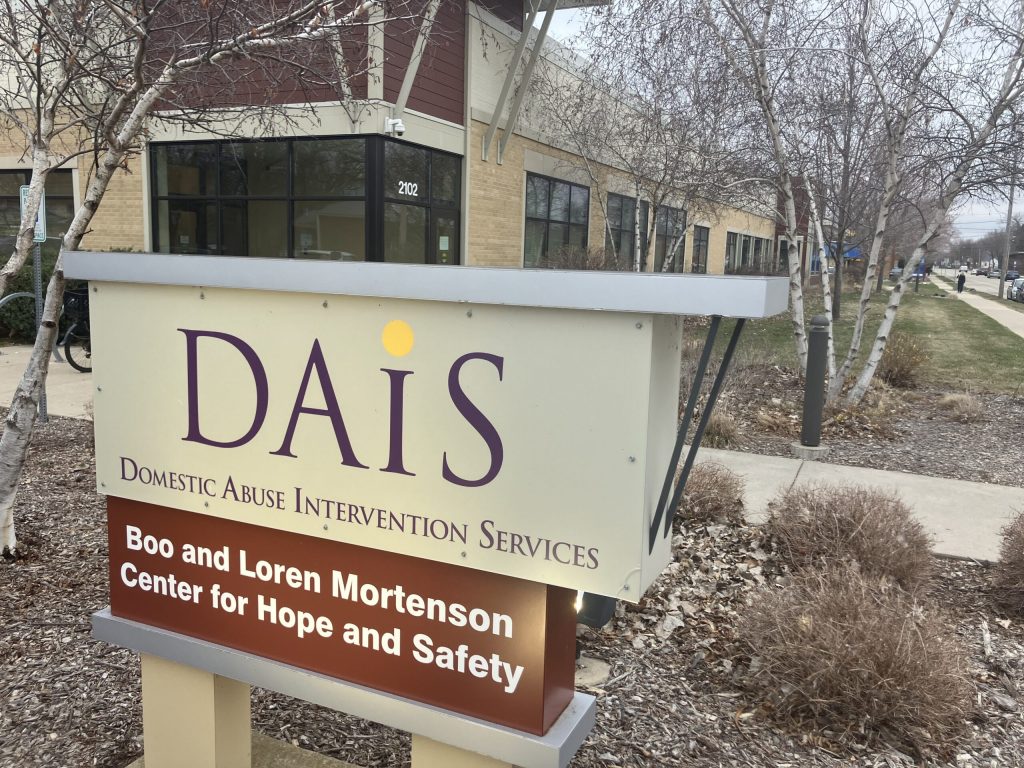With Federal Support Dwindling, AG Kaul Asks State For Funding Increase
Wisconsin’s allocation from the Victims of Crime Act has dropped by more than 70%.

The headquarters of DAIS, a nonprofit supporting victims of domestic violence, is pictured in Madison, Wis. on Thursday, April 10, 2025. Sarah Lehr/WPR
Wisconsin Attorney General Josh Kaul is asking for state money in the next budget to help offset dwindling federal funds for victim service providers.
In 1984, the federal Victim of Crimes Act, or VOCA, created a fund that distributed money to public and private agencies that support support crime victims. Money in that fund comes from fines and fees paid out by people convicted of federal charges.
In Wisconsin, that money bankrolls a broad range of services, including victim advocates, domestic violence shelters, counseling and crisis intervention programs.
But, in recent years, the federal funding available has dropped from its peak in 2018, prompting cutbacks at agencies supporting victims.
Kaul, a Democrat, says that’s impeding access to “life-saving” services.
“In some cases, there are fewer staff members available,” he said of the cutbacks during a news conference Thursday at the Madison headquarters of a nonprofit called Domestic Abuse Intervention Services. “Some places have reduced hours. There have been programs that have been eliminated.”
In the current federal fiscal year, Wisconsin is set to get about $13 million from the VOCA fund — a drop of more than 70 percent compared to five years ago.
That’s raising alarm bells from advocates, creating “ripple effects” that tear into the safety net for survivors, said Shannon Barry, executive director of DAIS.
“Those victims don’t disappear,” Barry said of organizations being forced to reduce services. “They just need to find a different place to find help, and it puts more strain on the rest of us, many of whom are already stretched to capacity.”
VOCA funds are crucial to organizations like Madison-based RCC Sexual Violence Crisis Center, said Dana Pellebon, RCC’s executive director.
RCC offers resources to sexual assault survivors, including therapy, support groups and a 24-hour helpline. It also employs advocates who help survivors navigate the medical and legal systems.
“If we are not there, that means at 3 a.m., someone has to come into the hospital by themselves and talk through the worst time of their life without anyone to explain to them what the process is,” Pellebon said.
From fiscal years 2020 to 2022, Wisconsin got an average of about $44 million from VOCA. Funds have been reduced since then, but Wisconsin has been able to make up the difference using other funding sources.
In fiscal year 2023, Wisconsin used $6.6 million in federal pandemic relief money from the American Rescue Plan Act, or ARPA, to supplement $37.2 million VOCA funds. And last year, Wisconsin used a combination of $13 million from ARPA and $10 million in one-time state funding to bolster $30.7 million from VOCA.
But with pandemic funds tapped dry, Kaul is now asking state lawmakers to set aside $32 million in state money in the next fiscal year for victim service programming.
That extra state funding would total near $68 million over the next two-year budget cycle, and would allow the Department of Justice’s Office of Victim Services to keep 17 staff positions that were previously funded by VOCA, according to the DOJ’s latest budget proposal.
After agencies including the DOJ submitted their own budget requests, Democratic Gov. Tony Evers released his $119 billion budget blueprint in February.
Wisconsin’s Republican-controlled Legislature has started holding budget hearings, and is expected to vote on a spending plan by the time the new fiscal year starts on July 1.
Governor calls for imposing another surcharge on people sentenced for crimes
In his budget request, Evers proposed allocating just over $70 million over two fiscal years, so the state can give out grants to victim services groups. That money is intended to supplement declining federal VOCA allotments, the budget documents explains.
And the governor suggests creating a “victim services surcharge” to pay for those grants. Under Wisconsin law, courts already impose a number of surcharges on people sentenced for committing crimes or violating local ordinances.
The newly-created victim services surcharge would be 40 percent of any fine or forfeiture imposed or $40, whichever is greater, plus $50 for each conviction of a misdemeanor or felony, according to the governor’s budget bill.
Although Kaul’s budget calls for funding victim services grants through general purpose revenue instead of through an additional charge on people sentenced in court, the attorney general told reporters he’s “open” to the surcharge proposal.
“I’m more than happy to work with legislators to figure out what mechanism they’re interested in supporting to make sure that we fund victim services and that we keep critical positions at the Department of Justice,” Kaul said Thursday. “As to what mechanism that is, that’s not my focus.”
As federal funds for crime victims dwindle, Wisconsin AG asks state to fill gap was originally published by Wisconsin Public Radio.
If you think stories like this are important, become a member of Urban Milwaukee and help support real, independent journalism. Plus you get some cool added benefits.





















